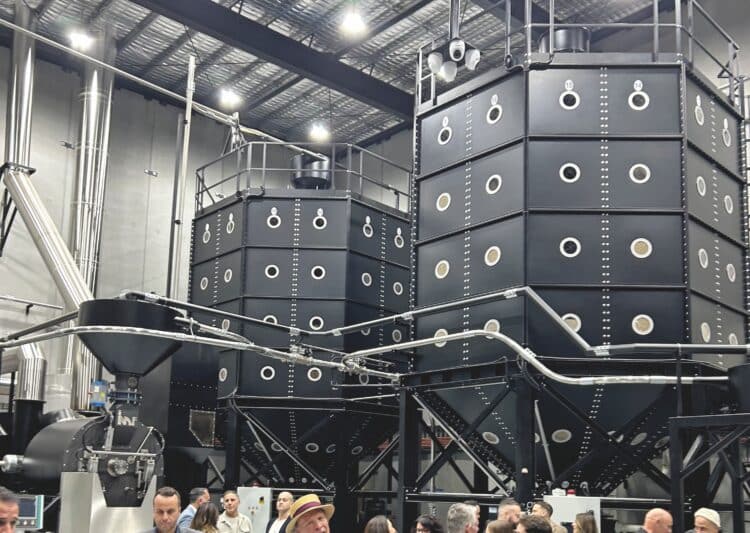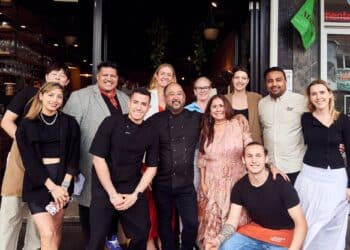An “unrivalled” $25 million coffee roasting utopia has just opened in the Sydney suburb of Roselands. Fully equipped with IMF roasting equipment, it’s been created for the region’s coffee lovers and innovators.
Michael Rababi has been involved in almost all corners of Australia’s coffee scene for decades. From equipment supply, rental, and servicing to coffee training, roasting, and retail, the Di Pacci Coffee Company Managing Director’s expertise has aligned to create a new purpose-built communal roastery in southwest Sydney.
The Roasting Club, a five-storey facility in Roselands, covers every aspect of the coffee roasting process – and everything around it. From roasting classes and education to green-bean procurement and bookable office spaces, boardrooms, and cupping stations, it’s designed to be a coffee-lover’s paradise.
The Roasting Club has been designed to service a range of companies from boutique roasters to large organisations.
For a monthly fee, members can gain access to The Roasting Club’s suite of roasting equipment and the amenities that, Michael says, set it apart from other roasteries in Australia.
“Starting from the basement, there’s an underground carpark for up to 15 vehicles and rentable warehouse space for private storage. There’s also pallet racking available,” he says. “Then you travel up to the ground floor, which has our IMF roasting equipment and 12-kilogram shop roaster.
“Level one contains a members’ hot-desk office. We provide computers, printers, and internet so members can manage all their invoicing while they’re at the facility. It also has a cupping lab, which has multiple sample roasters including a 300-gram IMF sample roaster, as well as Sanremo You and Slayer LP espresso machines, V60s, and grinders including a Ditting Lab Sweet and a Mahlkonig EK43.
“From there, you move onto the largest Modbar setup in the world. We have a 14-group gold-plated La Marzocco Modbar on an Italian Calacatta bench with an eight-metre cupping table. That room has a full wet bar along with LED lighting and screens. It’s perfect for presentations, impressing customers, hosting training sessions, and holding smack downs.”

Continuing up through the building from the cupping and training facilities there are members’ and events spaces.
“Level two has private offices and a big, beautiful boardroom that opens up onto a 70-person standing patio, which can all be booked,” continues Michael. “Level three has a members’ lounge that has a coffee machine, fully stocked bar, and a 10-metre LCD screen that can play presentations or host conferences.
“There’s also a cantilever balcony that hangs out over the roastery with floor-to-ceiling glass. It’s like you’re in a capsule watching everything happen from upstairs. Finally, we also have a Skydeck with a great view of Sydney on the top floor.”
Back on the ground floor, the roastery is fitted out with the latest IMF equipment. It took IMF technicians just eight weeks to complete installation and testing of all the equipment. IMF’s Australasian agent Will Notaras from Roastquip oversaw the installation.
“It’s the largest IMF roasting plant in the Southern Hemisphere. The installation went like clockwork,” he says.
Sixty- and 240-kilogram roasters are complemented by a 48-tonne green bean silo and 24-tonne roasted coffee silos with a 300-kilogram blender and grinding station. Coupled with a pair of pre-made bag packaging machines and an integrated fully automatic system, coffee can travel from the start to the end of its roasting journey automatically with no human contact – all through IMF equipment. The facility has the capacity to roast up to 100 tonnes per week.
“We can pack and box more than 1000 kilograms of coffee per hour without touching anything. Any coffee we work with will automatically go into the blender, then the packaging machines. Once the recipe has been programmed, all the roaster operator needs to do is pack the coffee straight into the boxes,” says Michael.
“The green bean silo can house up to 16 origins, so roasters can either come to the facility to purchase what we have available or they can bring their own beans and roast them themselves.”
Why, then, did Michael and the team at The Roasting Club choose IMF over other roaster manufacturers to deliver this large-scale project?
“There were a lot of reasons we went with IMF. The small footprint of the equipment was a major factor,” says Michael. “IMF’s equipment is really neat and compact and was easy to install. It’s a full turnkey solution with silos, blenders, and packaging machines that communicate to the coffee roaster.
“Its automated programmable logic controller (PLC) software is user friendly, and there is only a maximum variation of one degree Celsius along the roasting curve resulting in incredible consistency. The roaster operator can also roast in semi-auto or manual modes.
“We also chose IMF because of the quality construction, accurate temperature control, and the recirculating heat technology that saves gas. I also think it’s the best-looking roasting equipment out there,” says Michael.
When building The Roasting Club from the ground up, there was a clear focus from Michael and the team to create a space that is as energy efficient as possible. A key part of that focus led to the installation of a 100-kilowatt solar panel system on the roof, but it was also another major reason why he chose IMF.
“IMF’s afterburner is integrated into the roaster, and by using recirculating heat technology to simultaneously heat the beans and incinerate the emissions using one burner it saves a minimum of 30 per cent in gas consumption. This not only drastically reduces greenhouse emissions entering into the atmosphere but also saves enormous amounts of money on gas,” he says.
“Above all, I find with IMF roasters there is a cleaner, brighter taste to the coffee with a lot more flavour depth and clarity. There’s no smokiness compared with other roasters I’ve used.”
Access to The Roasting Club facility starts from $99 per month for individuals, with pricing scaled for small to medium businesses and larger enterprises. Michael says the final piece of the puzzle in creating this facility was to implement a price model that opens it up to Sydney’s entire coffee community.
“I wanted to make it as accessible as possible for everyone and felt even a small roaster could afford $25 per week, even for a place where the green beans and bags storage are included,” he says.
“It’s a facility for the people of Sydney and surrounds who love coffee and want to work in the industry.”
For more information, visit theroastingclub.com.au or roastquip.com.au




